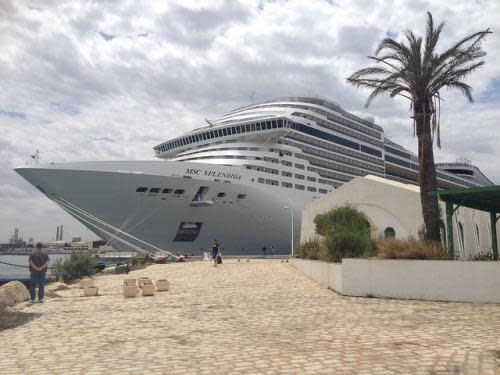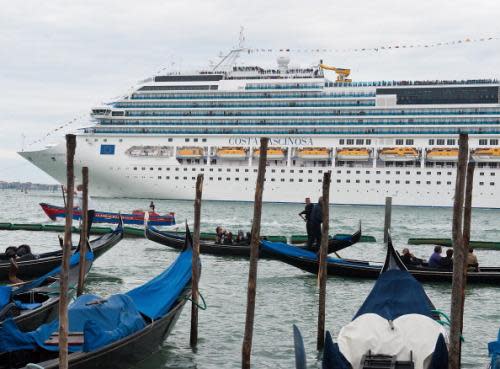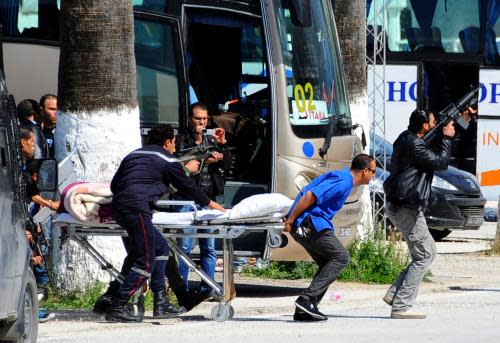How the Cruise Industry is Coping with ISIS Attacks on Passengers in Tunisia

At least a dozen passengers from the MSC Splendida, seen here docked in Tunisia in 2009, were killed in Wednesday’s attack in Tunisia. (Photo: Heather Cowper/Flickr)
The cruise industry is reeling from news that many of the victims from the horrific ISIS attack on the Bardo museum in Tunis were passengers on two separate cruise ships docked in the city’s port.
Now the industry is struggling to figure out what this means for future cruises to the region and how to keep current passengers safe.
On Thursday morning, officials confirmed that cruise-ship passengers were among the 20 reported fatalities.
MSC Cruises reported that 12 guests of the MSC Splendida were among those killed in the Tunisian capital of Tunis when gunmen opened fire at the Bardo. The dead include two Colombians, three French, three Japanese, two Spanish, one British and one Belgian. They had been on a shore excursion in the museum.
In addition, Costa Cruises says three passengers from the Costa Fascinosa also were killed.
Related: Following Tunisian Attacks, is North Africa Safe for Tourists?
A number of passengers from both ships were injured: 13 from the Splendida (one Belgian, seven French, four Japanese and one South African) and eight from the Fascinosa.
There was a smattering of good news. MSC says that two passengers who’d been missing were found safe; the pair, a Spanish couple, had spent the night in hiding at the Bardo National Museum. The woman, who is pregnant, was immediately taken in observation to the hospital. “Both her and the child are reported well,” says MSC. Meanwhile, two people from the Costa Fascinosa remain unaccounted for.
The frightening aftermath

Passengers from the Costa Fascinosa (pictured here in this 2012 photo) were unaccounted for in the hours after the attack in Tunisia. (Photo: Getty Images)
The aftermath of the attack was especially frantic for the MSC and Costa ships. Both ordered all passengers who’d ventured ashore in Tunis to return to the ships. MSC said said it provided free on-board telephone and Internet service for passengers wishing to contact loved ones. Both Fascinosa, which had more than 3,000 guests on board, and Splendida, carrying about 3,700, spent the hours after the attack in port under heavy guard.
Related: How to Stay Safe on a Cruise
“Our deepest sympathy and our condolences go to the victims and their families,” Costa tells Yahoo Travel in a statement. “We share their sorrow.”
And on its Facebook page, the Cruise Lines International Association (CLIA) says, “All of us grieve with the families and friends of the victims of yesterday’s tragic attack in Tunisia.”
Concerns about Tunisia

Wednesday’s attack will almost certainly affect the future of cruising in Tunisia. (Photo: AP)
The tragedy is made more devastating by the fact Tunisia was considered one of the more peaceful countries in the region. Its historic sites and pro-Western vibe had long attracted tourists — and cruise ships.
But then came the Arab Spring of 2011 when Tunisia, and later other countries in the region, rebelled against their rulers. The unrest that followed made tourism in the region a difficult prospect. Egypt, for instance, has yet to fully ease security concerns. After tourism finally showed signs of life, increasing by 70 percent in 2014, Cruise Critic reports a U.S. security alert earlier this month prompted several cruise lines Seabourn and Holland America to cancel its journeys there.
Tunisia was supposed to be different. Its revolution was generally considered successful, and cruise ships were freely traveling there. In addition to Costa and MSC, Princess, Holland America, P&O International and Oceania are among the lines that have stops planned in Tunis during this year’s Mediterranean sailings. Norwegian Cruise Lines is one notable exception. Almost a year to the day before this week’s attacks, Norwegian Cruise Lines abruptly canceled all ports of call to Tunisia, after Israeli passengers aboard the Norwegian Jade were denied entry by Tunisian officials.
And yet, some experts had been predicting that a terrorist attack against cruise ships in the region was likely. Jim Walker, a Miami-based maritime lawyer who runs the website Cruise Law News, wrote in February that “there are numerous studies by security companies and U.S. governmental organizations which have studied terrorist organizations and concluded that terrorism against cruise ships is likely.”
“Families thinking of cruising in the Pacific Northwest (Seattle, Vancouver, Alaska) may be reasonably safe from an ISIS attack. A terrorist attack seems extremely unlikely to happen in the Caribbean,” Walker wrote. “But sailing into a port in Morocco, Tunisia, or Egypt on a cruise ship? It’s not a matter of if. It’s just a matter of when.”
Now, other cruise lines are evaluating their futures in Tunisia. Princess Cruises tells Yahoo Travel: “We will continue to monitor the situation. And any decisions to modify our itineraries will be guided by information and recommendations from a variety of U.S. government and security agencies.”
Holland America tells Yahoo Travel: “We have not made any decisions yet regarding our future scheduled calls to Tunisia. Our thoughts and prayers go out to all those affected by this tragic event.”
Another look at safety
Regardless of what happens with future journeys to Tunisia, this incident will almost certainly cause cruise lines to re-think their passenger security procedures in ports of call. “For many years, CLIA Member cruise lines have coordinated closely with national and international security and law enforcement authorities around the globe to help ensure passenger safety, and they will continue to do so,” CLIA says in its Facebook statement. “As always, CLIA will work with member cruise lines and the authorities to assess measures that would help to provide additional passenger safety and security.”
It appears cruise lines will take some time before deciding what changes they may make in their security methods, or their future trips to Tunisia. But similar to the effect the 9/11 attacks had on the airline industry, Wednesday’s slaughter in Tunisia is something that could very well change cruising as we know it.
